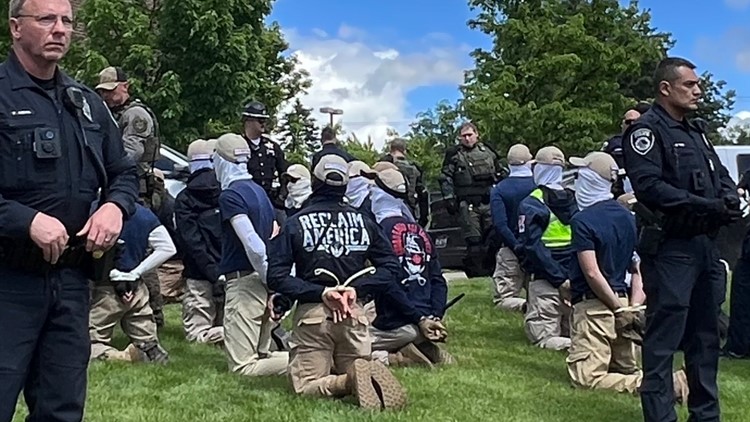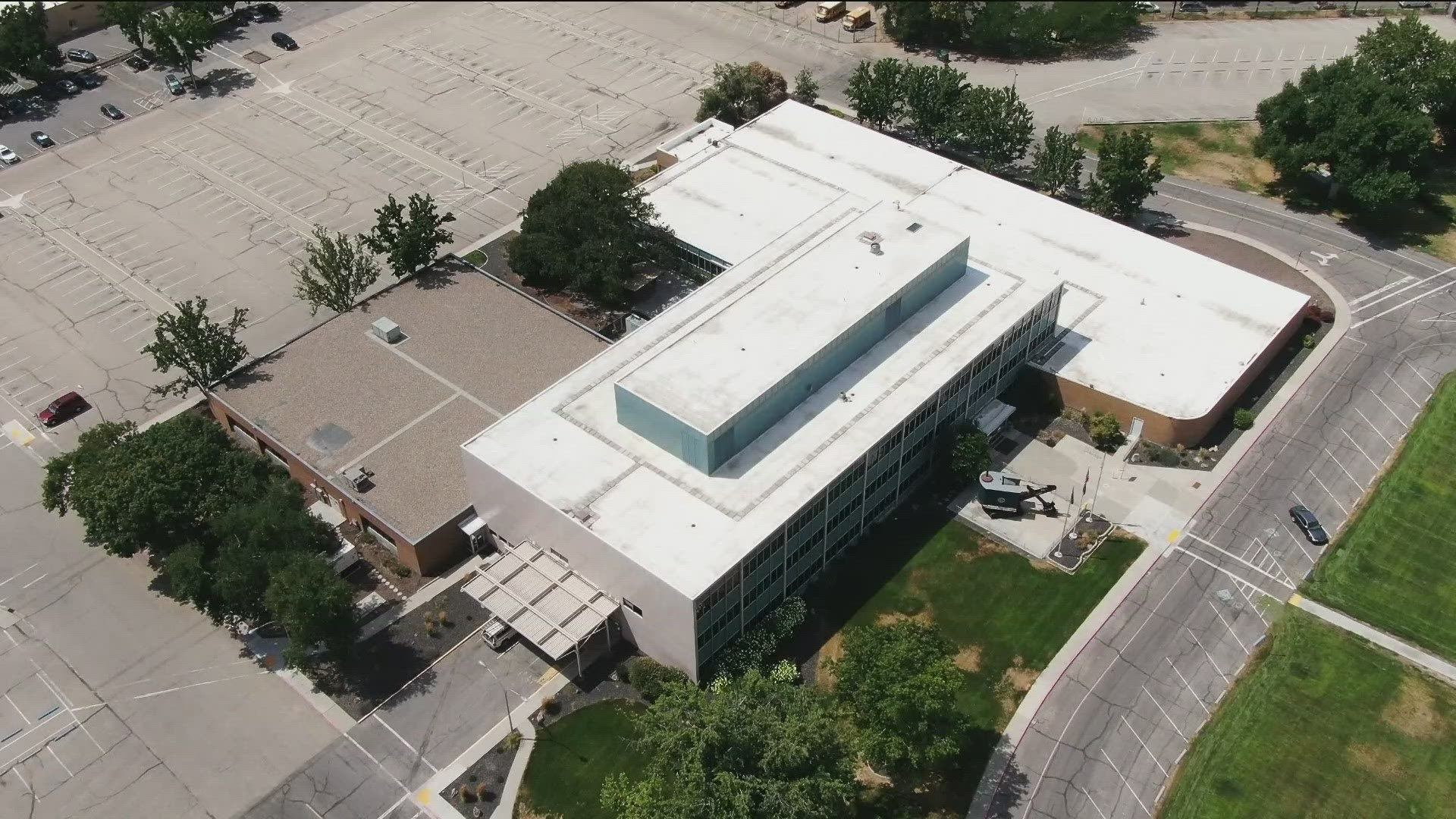BOISE, Idaho —
This story originally appeared in the Idaho Press.
Both of Idaho’s last two U.S. attorneys say the June 11 arrests of 31 members of a white nationalist group for conspiracy to riot at a gay pride event in Coeur d’Alene is the type of thing that federal prosecutors should look into — and likely are examining.
Bart Davis, a Trump appointee who served as U.S. attorney for Idaho from 2017 to 2021, said, “All I know are what the news accounts are. … I don’t know what actually occurred. But I do believe that these are the kinds of matters that the federal government has some role in.”
All 31 men already are facing state misdemeanor charges of conspiracy to riot.
“Oftentimes, the city or the county or the state, they don’t need the help of the federal government,” said Davis, the former longtime Idaho Senate majority leader. “They’ve more than got it handled. … But there are some tools that the federal government does have that can help in either an investigation or sometimes in the prosecution of this kind of an event.”
All but two of the 31 men arrested were from other states besides Idaho; some had traveled from as far as Illinois, Alabama, Texas and Michigan.
“You have the interstate transportation of individuals for a specific purpose,” Davis said. “And if the publicized purpose is correct, then I think that’s another factor for a federal review and consideration of whether there should be a role.”
Wendy Olson, an Obama appointee who served as U.S. attorney for Idaho from 2010 to 2017, said there are numerous federal statutes that could apply to the case, but it would depend on the details, and whether federal hate crime laws apply.
Those include the Matthew Shepard and James Byrd Jr. Hate Crimes Prevention Act of 2009, 18 USC 249, which was the first law passed by Congress authorizing federal criminal prosecution of hate crimes motivated by the victim’s actual or perceived sexual orientation or gender identity. However, Olson noted, that law requires a violent act that results in bodily injury, or an attempt to commit a violent act with a dangerous weapon, along with interstate travel and hate-crime motivation.
The Patriot Front members were arrested before they ever arrived at the event that was their intended target. According to news reports based on court records, no firearms were found with them in the U-Haul truck where they were hiding, though they did have metal shields, “abnormally long” metal flag poles and other items, the Coeur d’Alene Press reported.
“They could be used dangerously,” Olson said, “but I don’t think a long pole itself is considered a dangerous weapon under federal law.”
“Sometimes when conduct gets disrupted, that’s the best thing, to disrupt the conduct,” she said, “but you don’t have conduct that that would be a basis for a prosecution.”
Another federal hate crime that at first blush would appear to apply also may not precisely fit the case, Olson said. The Conspiracy Against Rights statute, 18 USC 241, makes it “unlawful for two or more persons to conspire to injure, threaten, or intimidate a person in any state, territory or district in the free exercise or enjoyment of any right or privilege secured to him or her by the Constitution or the laws of the U.S.”
However, Olson said, “I do not think there is a potential 241 violation. The challenging part with 241 is identifying the underlying statutory or constitutional right.”
While the First Amendment to the U.S. Constitution guarantees the right to peaceably assemble, it prohibits government action that interferes with that right, not private action.
Another federal law prohibiting discrimination in public accommodations, 42 USC 2000a, which is part of the Civil Rights Act of 1964, only covers discrimination based on race, color, religion or national origin.
Olson said she believes it’s “absolutely” a case that merits federal review. “I’m confident that the U.S. Attorney’s office is looking carefully at all of the facts here, and assessing whether there’s a prosecution to be brought,” she said. “It’s important, obviously, to do their due diligence on what is potentially criminal conduct of this nature. … I also think it’s important for any enforcement agency with potential jurisdiction to give it a long, hard look and if there is a viable prosecution, to move forward aggressively to demonstrate that this kind of conduct is not tolerated in Idaho.”
“If it’s criminal conduct, it will be pursued as strongly as possible,” she said. “It may be that there are not laws that will allow a (federal) prosecution here. But intimidating conduct is certainly something that deserves the whole examination of law enforcement to determine if there are appropriate criminal charges.”
State and federal jurisdictions can overlap in some cases when it comes to criminal prosecutions. In most cases, the different jurisdictions collaborate on which takes the lead, but in some cases, both state and federal prosecutions may occur.
“There’s not a double jeopardy issue, because it’s two separate sovereigns,” Olson explained. Policies established through federal case law determine when that will occur, she said, and outline specific circumstances that could warrant it. “One is that justice hasn’t been done, that there’s some federal interest that has not been met,” Olson said. That federal policy is known as the Dual and Successive Prosecution Policy, or Petite policy, named after Petite v United States, a 1960 U.S. Supreme Court decision.
A famous example of that was the Rodney King case in California, in which multiple California police officers severely beat King, a Black motorist, after stopping him for speeding, a beating that was captured on videotape. King was released without charges, and four officers were prosecuted for the beating. In their state trial, two were acquitted by a jury that included no Black members, prompting riots in Los Angeles that caused widespread damage and led to 53 deaths and 7,000 arrests.
Subsequently, federal charges were brought against the four officers for violating King’s civil rights, and two were convicted.
Olson said federal charges were brought more recently in the Derek Chauvin prosecution over the murder of George Floyd, and in the Ahmaud Arbery case, in which a Black jogger was shot to death by two white men in Georgia in 2020. In both cases, federal prosecutions took place after the state prosecutions.
In the Coeur d’Alene Patriot Front incident, Olson said, “My guess is … if there was a reason to prosecute these guys federally, that the Petite policy likely would not stand in the way.”
This story originally appeared in the Idaho Press. Read more at IdahoPress.com
Watch more Local News:
See the latest news from around the Treasure Valley and the Gem State in our YouTube playlist:



